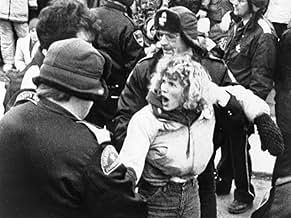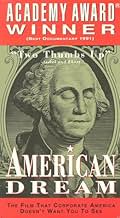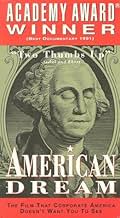PUNTUACIÓN EN IMDb
7,8/10
1,1 mil
TU PUNTUACIÓN
Añade un argumento en tu idiomaRecounts the 1985-86 strike against the Hormel Foods Corporation in Minnesota after its employees' wages and benefits were cut.Recounts the 1985-86 strike against the Hormel Foods Corporation in Minnesota after its employees' wages and benefits were cut.Recounts the 1985-86 strike against the Hormel Foods Corporation in Minnesota after its employees' wages and benefits were cut.
- Ganó 1 premio Óscar
- 12 premios y 3 nominaciones en total
Dan Rather
- Self
- (metraje de archivo)
Ronald Reagan
- Self
- (metraje de archivo)
Reseñas destacadas
This Oscar-winning 1991 documentary is captivating, personal, and heartfelt. It is also, however, a bleak and dark film, and the vantage it provides into American capitalism is a haunting one. Much like Kopple's previous documentary: "Harlan County, U.S.A.," "American Dream" is more than an examination of a labor dispute. (Specifically, the 1984 strike of Hormel, Inc. meatpackers in Minnesota). This film asks that we look at the bigger picture, and it was made during a time when the American economy was faltering. Through her frank and journalistic interactions with various stakeholders, Kopple presents a riveting deconstruction of the working class in America, as well as big business and the interworkings of organized labor. Underneath it all, though, this is a human interest story, and watching the strike unfold chronologically - from various viewpoints - is magnetizing. Brother is pitted against brother, union against union, and Kopple's delicate political handling is masterful. Anyone interested in organized labor in America, as well as the sometimes fleeting notion of the American Dream, this is one you SHOULD NOT MISS. This is gripping, psyche-dwelling stuff. (PS: During the film's closing credits, take note of the huge amount of organizations and people who contributed their money, and volunteeered their talent to this project. Perhaps nothing else is greater testament to its importance). ---|--- Was this review helpful?
10jgtoms
This film is absolutely stunning. It centers around union meatpacking workers at a Hormel plant in Austin, Minnesota in the mid-80's. The trouble started when Hormel cut worker pay from $10.69 an hour to $8.25 an hour. The problem? Hormel had just posted a net profit of $30 million. As one worker at a union meeting put it, "If we have to take a cut of $2.45 an hour when the company just made $30 million, I hate to think of what's gonna happen when they actually post a loss." With no help from their parent union, International Food and Commercial Workers Union, the local union (P-9) goes on strike alone trying to bring Hormel to its knees. Director Barbara Kopple, who also made the great "Harlan County, USA", does an outstanding job of capturing every important moment. She has the camera there at every union meeting, press release, Hormel press release, etc. She also shows the very personal aspects of a strike going into people's homes and showing their innermost feelings about what's going on. In the end, the strike is long, drawn out, and things appear bleak. The constant Minnesota cold, snow and ice are always in the background as well. If one doesn't have a greater appreciation for unions and what they have to sometimes endure after watching this film, he/she probably didn't pay very good attention.
Barbara Kopple's American Dream is a painful but honest on all sides look at what labor unions have to go through when they go into strike- mode, and how corporations, starting in the 80's, say the unions flaws in negotiating as a means to get in to change things for their benefit. It's that kind of movie though that doesn't discriminate in a key way - I think if you're pro-union or anti-union even, you can get something out of this take by how Kopple presents everything. The characters here all want what's best, but it's not so simple as'let's negotiate a contract'. Sides become fractured, tempers get flared, and a 'labor consultant' arguably muddies the waters early on in the negotiating. By the time it gets to be many weeks into the strike, some of the folks on the picket lines get desperate, cross and go back to work, and the sides become even more fractured.
It's about the Hormel meat-packing district, but the staying power of the film is this: it could be anywhere. Is it just about if wages decrease by two dollars, or four dollars, or about something more when it comes to bargaining, the rights of workers, and who is really in control? The interviews and perspective are in large part on Lewie Anderson, who probably has the most common sense as we can see it (or rather in comparison with the Consultant Ray Rogers, who is technically a corporate guy as well), and how he has to approach the union and the chief committee about where to go with Hormel - and of course the flaws are there, like rewriting the contract that has forty years of bargaining in it for the rights of the workers.
This is not to say that, for the warts-and-all approach Kopple takes, that she is on the side of the corporate masters at Hormel. We see one of their spokesman, who is a down-the-line party guy, talk to the camera(s) with the candor that one expects from such a corporate man about dealing with the union leaders (maybe not as villainous as, say, a Roger Smith from Roger & Me, but what is). But it's mostly there, in those halls and on the picket lines and in those smokey, emotional offices that Kopple takes her sights and tells this story. How it becomes a tale for almost everyone (not to say that, probably, those who have worked in unions or know people who have, that makes up a good lot of Americans, will connect deeper with it) is that it's not about complex legal wrangling. It's about what people do when pushed up against a wall, and put themselves into a war.
It is a complicated tale to tell, that is without easy answers, but by the end you can't say you don't see how things did not turn out well, especially with the greater picture (albeit not shown really or at least on the level of the 'smaller-but-bigger' picture the director paints) that the country was in at the time, and still are. What happens to these Americans, all hard workers, when faced against corporate pressures, and then other workers are brought in across the picket lines. What happens to society?
It's about the Hormel meat-packing district, but the staying power of the film is this: it could be anywhere. Is it just about if wages decrease by two dollars, or four dollars, or about something more when it comes to bargaining, the rights of workers, and who is really in control? The interviews and perspective are in large part on Lewie Anderson, who probably has the most common sense as we can see it (or rather in comparison with the Consultant Ray Rogers, who is technically a corporate guy as well), and how he has to approach the union and the chief committee about where to go with Hormel - and of course the flaws are there, like rewriting the contract that has forty years of bargaining in it for the rights of the workers.
This is not to say that, for the warts-and-all approach Kopple takes, that she is on the side of the corporate masters at Hormel. We see one of their spokesman, who is a down-the-line party guy, talk to the camera(s) with the candor that one expects from such a corporate man about dealing with the union leaders (maybe not as villainous as, say, a Roger Smith from Roger & Me, but what is). But it's mostly there, in those halls and on the picket lines and in those smokey, emotional offices that Kopple takes her sights and tells this story. How it becomes a tale for almost everyone (not to say that, probably, those who have worked in unions or know people who have, that makes up a good lot of Americans, will connect deeper with it) is that it's not about complex legal wrangling. It's about what people do when pushed up against a wall, and put themselves into a war.
It is a complicated tale to tell, that is without easy answers, but by the end you can't say you don't see how things did not turn out well, especially with the greater picture (albeit not shown really or at least on the level of the 'smaller-but-bigger' picture the director paints) that the country was in at the time, and still are. What happens to these Americans, all hard workers, when faced against corporate pressures, and then other workers are brought in across the picket lines. What happens to society?
"American Dream" is a sobering and fascinating documentary depicting the social, economic and emotional ramifications of a labor strike initiated by employees at a Hormel meatpacking plant in Austin, Minnesota. Although the film depicts events that take place in 1986, the content is every bit as relevant today on the subject of the perennial gap that exists between rank-and-file workers and top executives at major U.S. corporations, and the general greed and mercenary attitude that drives said corporations at the expense of hard-working employees. Like "Roger & Me," the acclaimed documentary by Michael Moore that savaged General Motors and the 80's corporate ethos of "profits above everything else," "American Dream" is a priceless portrait of blue-collar work and life in small-town America, the kind of place that people who live in New York, Washington D.C., Los Angeles or any other major metro area will probably never see.
Austin is a town where one company is the largest employer (in this case, the Hormel meat company), on whom generations of workers depend for their livelihood. The film puts a human face on the repercussions that result when Hormel, despite record profits, cuts the salaries of its workers. If the balding, grey-suited, humorless Hormel executives depicted here (wearing huge eyeglasses in the style of Lee Iaccoca) are not the epitome of 80's greed, I don't know what is. They are Gordon Gekko come to life, caring only about their bottom line and how to maximize profit, completely indifferent to the plight of their workers. The Enron debacle shows that, for all their economic might and wealth creation, there is a dark side to corporate America. "American Dream," its ironic title aside, is a journey to that dark side that should be seen by every worker, blue-collar or white-collar. Try to catch it on the Sundance or Independent Film Channel.
Austin is a town where one company is the largest employer (in this case, the Hormel meat company), on whom generations of workers depend for their livelihood. The film puts a human face on the repercussions that result when Hormel, despite record profits, cuts the salaries of its workers. If the balding, grey-suited, humorless Hormel executives depicted here (wearing huge eyeglasses in the style of Lee Iaccoca) are not the epitome of 80's greed, I don't know what is. They are Gordon Gekko come to life, caring only about their bottom line and how to maximize profit, completely indifferent to the plight of their workers. The Enron debacle shows that, for all their economic might and wealth creation, there is a dark side to corporate America. "American Dream," its ironic title aside, is a journey to that dark side that should be seen by every worker, blue-collar or white-collar. Try to catch it on the Sundance or Independent Film Channel.
I was raised in a beef slaughtering plant family in Northeastern Colorado. My father was a member of UFCW Local 7 for many years as well as my brothers and my mother. Watching this movie brought back memories of how life was during strike time. I will hand it to Kopple, about catching the true realities of a plant family on strike. The scenes of the negotiation teams and plant management were excellent, since I didn't get to see what happens behind closed doors, there were guys that told me, but it really hits home when you see it. The scenes of the slaughter, even though my family worked in beef plant and this was a hog plant, I could hear the noise and smell the smells and oddly enough, it was like being back home. This movie brought some tears to my eyes and some bittersweet memories...please e-mail if you have any questions about what life is like on strike...
¿Sabías que...?
Selecciones populares
Inicia sesión para calificar y añadir a tu lista para recibir recomendaciones personalizadas
- How long is American Dream?Con tecnología de Alexa
Detalles
- Fecha de lanzamiento
- Países de origen
- Sitio oficial
- Idioma
- Títulos en diferentes países
- Американская мечта
- Localizaciones del rodaje
- Empresas productoras
- Ver más compañías en los créditos en IMDbPro
Taquilla
- Recaudación en Estados Unidos y Canadá
- 269.823 US$
- Fin de semana de estreno en EE. UU. y Canadá
- 9291 US$
- 22 mar 1992
- Recaudación en todo el mundo
- 269.823 US$
Contribuir a esta página
Sugerir un cambio o añadir el contenido que falta





















